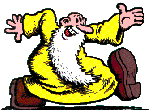
Books
Charlee and I are bibliomaniacs. We have recently begun downsizing, selling the books over the Internet that we don't think we will be able to read before we die.
Visiting bookstores is always fun but can be expensive if you are a bibliomaniac like I am. There are good sources of books to be had over the net, too. I have found the following to be quite useful.
A great source of used books. Most are at half-price or below. You can pre-order a book so you will be get it when someone puts it up for sale. They also have VHS tapes, DVDs, and CDs. We sell a lot of stuff here as well as buy. Isn't it better to recycle your old books to someone who wants to read them rather than have them gather dust on a shelf and have more trees cut down to reprint more books?
- Over one million books orderable over the internet. Many are discounted 30%. Amazon also sells used books. Amazon is a great place to browse also.
- On-line catalog of a large used bookstore in Portland, Oregon where you have a good chance of finding a used or out-of-print book.
I learned to
read by pestering my parents prior to entering school. Ever
since, books have been a major part of my life. The web seems a
good place to share some of the links made through books over the years.
Like many
children, I liked to read fairy
tales.
These stories that have come down to us over the years, when not adulterated
by well-meaning modern compilers, provide a connection with an older time when
we didn't think we understood the world quite so well and a lot of it was mysterious
and scary. I recommend J.R.R.Tolkien's
essay On
Fairy Stories
for a wonderful view of this.
I devoured
books on science as a child, especially Astronomy
books. I also loved reading the encyclopedias, and read World
Book
from cover to cover at about age 8. It was a short hop from Fairy Stories
and Astronomy to Science Fiction and Fantasy books, and from about age 10 until
the present, this has been the favored genre for pleasure reading. (Escape,
you say? Well, what's wrong with that?) Favorite SF authors as a
child were Andre
Norton,
Isaac
Asimov,
and Robert
A. Heinlein.
In college, I discovered the works of J.R.R.
Tolkien,
my all-time favorite author. His friend, C.S.
Lewis
also wrote SF, although he was more famous for his wonderful books on Christianity.
Both of these authors have good web linkages to explore.
Along the
lines of SF & Fantasy, also recommended are Gene
Wolfe,
especially his Book
of the New Sun
series, Jack
Vance,
who has written hundreds of books in both the SF and Fantasy areas, Robert
Jordan,
who is currently writing a gigantic fantasy series called The
Wheel of Time,
George R.R. Martin, who is writing
an even better fantasy series about a medieval world, Song of Ice and Fire,
Orson
Scott Card,
author of many series, his best being the Ender Wiggin books, David
Brin's
Uplift
Wars
books, and the early Ursula
LeGuin
and Frank
Herbert's Dune
. These authors are the "cream" and no one should be disappointed
who delves into them.
Being a
typical science "geek" who avoided literature classes, I came late
to "mainstream" literature, which I blame on the way it is taught
in the public schools, which seems to turns kids off to it. With
maturity, I came to realize how important the vicarious experience is that we
can get by living through the eyes of a first-class author. I'll mention
John
Updike's
Rabbit
series as a good example of this, although there are many.
A favorite
author in Spanish is Jorge
Luis Borges,
the late Argentine author of fantastic fiction.
As far as non-fiction,
my favorite subjects are science, history (and history of science), philosophy,
and genealogy.
A book that was especially influential on my thinking and even on my career has been Douglas Hofstadter's Gödel Escher Bach: An Eternal Golden Braid. This book is a meditation on minds and machines, and in part led me to explore the field of artificial intelligence. It is a brilliant tour-de-force.

On
My Bookshelf